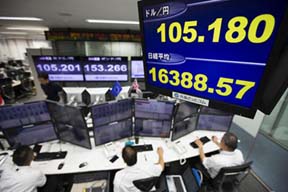 HONG KONG: The pound today collapsed to a 31-year low and there was pandemonium on currency, equity and oil markets as Britain voted to leave the European Union, fuelling a wave of global uncertainty.
HONG KONG: The pound today collapsed to a 31-year low and there was pandemonium on currency, equity and oil markets as Britain voted to leave the European Union, fuelling a wave of global uncertainty.
Sterling crashed 10 per cent to USD 1.3229 at one point, its weakest level since 1985, while the greenback itself slumped below 100 yen for the first time in two-and-a-half years as traders fled to safety.
In the weeks leading up to yesterday’s historic vote, there had been widespread warnings that a ‘Brexit’ would cause a rout across global markets that would wipe trillions off valuations, just months after a painful China-fuelled sell-off.
The doomsday scenario appeared to be playing out as markets suffered one of their worst days since the 2008 financial crisis after final results confirmed one of the EU’s big three economies would leave the bloc after four decades.
Fears are also growing that other EU members will push for referendums, posing the biggest threat to the future of grouping since its inception almost 60 years ago.
The pound earlier topped USD 1.50 following predictions the “remain” group would win, but as the Brexit camp posted early victories around the country, traders stampeded to put in sell orders. In Asian afternoon trade it was at USD 1.3690.
“Leave’s victory has delivered one of the biggest market shocks of all time,” said Joe Rundle, head of trading at ETX Capital. “The reverberations of the vote will be felt around the world.
“The extent of the damage on asset prices is hard to gauge but it’s likely to be bigger than anything since Lehmans at the very least,” he added, referring to the Wall Street bank whose collapsed precipitated the global financial crisis.
The dollar slumped briefly to 99.02 yen, the first time it has gone below 100 yen since November 2013, before edging back up above 102 yen.
The Bank of Japan said it was ready to work with other central banks to pump cash into financial markets to combat wild swings, while the Bank of England said it would take “all necessary steps” to avert a full-blown crisis.
Earlier Japan’s Finance Minister Taro Aso vowed a “firm response” to volatility if necessary.
A flight to safety also saw higher-yielding and emerging market currencies slump, with the Australian dollar down 3.4 per cent, South Korea’s won diving 2.4 per cent and the Indonesian rupiah shedding 1.7 per cent.
Malaysia’s ringgit was down 2.7 per cent, one of its worst days since 1998.
There were also heavy losses for the Canadian dollar and the Singapore dollar. Gold, another safe investment asset, surged six per cent to sit at a two-year high.
As the shock results rolled in, equity markets went into meltdown, wiping hundreds of billions of dollars off shares.
Tokyo plunged nearly eight per cent, Sydney shed 3.2 per cent and Seoul was 3.1 per cent off. Shanghai sank 1.3 per cent, while Taipei, Wellington, Manila and Jakarta all saw sharp losses. –AFP





